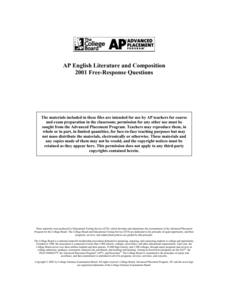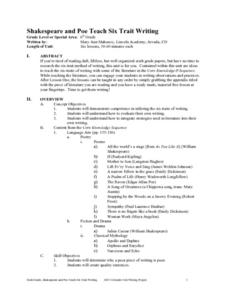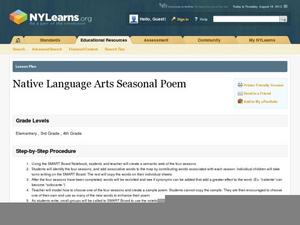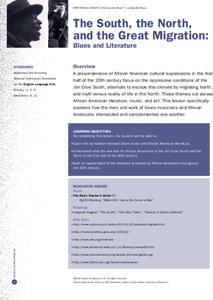College Board
2007 AP® English Literature and Composition Free-Response Questions Form B
Does a love for reading begin early in life? Scholars write essays using a passage from Seamus Deane in which he wrote about his childhood experiences with reading and books. They also create essays that focus on betrayal and elements in...
College Board
2009 AP® English Literature and Composition Free-Response Questions Form B
Do you have a political agenda? Some authors do. Scholars analyze a piece of work and determine how the author deals with a political or social issue. Responding to two other essay questions, writers create essays exploring how authors...
College Board
1999 AP® English Literature and Composition Free-Response Questions
Have you ever felt like you are pulled into two directions? Some authors depict this feeling in their characters. Scholars choose a play or novel in which a character is pulled or influenced by two different directions and write essays...
College Board
2001 AP® English Literature and Composition Free-Response Questions
Do 100 years make a difference? Scholars compare two poems written 100 years apart. They also analyze characterization used in a passage from Tom Jones by Henry Fielding. A final essay question allows writers to choose a piece of work...
College Board
2002 AP® English Literature and Composition Free-Response Questions
Good or evil? Some characters never identify themselves as either. Scholars create essays in which they examine morally ambiguous characters. Writers also analyze and write essays about the use of poem titles and take a close look at the...
College Board
2003 AP® English Literature and Composition Free-Response Questions Form B
Ever felt stuck in the middle? Some characters do. Scholars choose a novel or play and write essays describing how a character is stuck between cultures. Writers also analyze the techniques used in a passage from We Were the Mulvaneys...
College Board
2005 AP® English Literature and Composition Free-Response Questions
Santa is not the only one in the chimney! Scholars compare two poems written about using children as chimney sweepers. They also create essays about literary devices in a passage and about a character's struggle with inward and outward...
College Board
2008 AP® English Literature and Composition Free-Response Questions
Scholars are challenged to create essays comparing two poems in which the authors discuss fears and concerns about dying and life passing by too quickly. Two other essay questions ask writers to analyze literary elements and characters...
College Board
2009 AP® English Literature and Composition Free-Response Questions
Scholars select a novel or play and craft an essay to discuss what the symbol reveals about the characters or theme. Writers also analyze a passage and a poem to determine how the authors use literary elements to relay their messages.
Curated OER
Using Poetry
Students memorize the words to a teacher selected poem. They produce an audio recording of the poem. They create a new verse for the poem. They create a visual representation of the poem.
Curated OER
Great Robert Frost Poems: Fun Trivia Quiz
This 10-question quiz tests familiarity with several Robert Frost poems. Before giving this quiz, you will want to review the questions to be sure you've covered each of the poems.
Louisiana Department of Education
Fahrenheit 451
In his 2013 introduction to Fahrenheit 451, Neil Gaiman states, “Fiction is a lie that tells us true things, over and over.” In this extraordinary unit plan, readers "explore the power of written language to educate and influence...
Curated OER
Lesson: Impressions
Here, Autumn Poplars is the painting upper graders will analyze. They look at techniques, time period, and the use of impressionism to convey a natural theme. They go outside to make observations of nature and use what they see to write...
Curated OER
Shakespeare and Poe Teach Six-Trait Writing
A Six-Trait Writing instructional activity helps your middle schoolers liven up their word choice and shows them how to evaluate their own writing. Class members take a close look at the language used in poems by Shakespeare, Kipling,...
Curated OER
Lesson Plan: Finding Your Path
Our art often reflects who we are as individuals and as part of a larger community. The painting Hopi Eagle Dancer reflects the history and culture of the artists who created it. Critical thinkers analyze the piece and then compose a...
Curated OER
Lesson Plan: Letting Go
Why would an artist destroy his own work? Kids examine the Malagan practice of creating and then destroying art. They talk about the cultural and spiritual significance of this practice, as well as how it relates to consumerism in...
Curated OER
Lesson Plan: Blending Observation and Imagination
Upper graders analyze the work, Bouquet of Flowers in a Vase by Maria van Oosterwyck. They consider the value of her paintings and how they are still relevent and sought after, 350 years after they were created. The blending of...
Curated OER
Native Language Arts Seasonal Poem
Intended for native Spanish speakers, this plan provides an opportunity to create a class semantic web describing the different seasons and listen to Vivaldi's "Four Seasons." Learners will work together to revise their semantic webs,...
Poetry Internation Volume 17, 2011
Alliteration, Consonance, and Assonance in Poetry
Three poems, “Under the Mangoes” by Jacqueline Bishop, Eleanor Wilner’s “What It Hinges On,” and Robert Frost’s “Stopping by Woods on a Snowy Evening,” provide the text for an examination of alliteration, consonance, and assonance. After...
Curated OER
Poetry Appreciation – "The Raven"
Introduce your class to "The Raven" by Edgar Allan Poe with this series of activities, exercises, and worksheets. Class members examine an image, analyze a movie trailer, read a prose version of the poem, look up vocabulary, and pick out...
Worksheet Place
Back to School Acrostic Poem
Acrostic poems are a great way to get your class in the back to school mode. Each poet will compose a poem using the letters of the words 'back to school' as the beginning of the first lines of each line of the poem. There are many...
Curated OER
A History of Poetry
What has rules and has no rules? What has rhythm and rhyme, and no rhythm or rhyme? What is arranged carefully and is scattered? Why, poetry, of course. Although text-heavy, this PowerPoint does provide a context for the study of poetry...
Curated OER
Types of Poetry
Expose your class to various poetic forms. Listed in and described in this slide show are: ballad, lyric poem, ode, dramatic monologue, sonnet, and villanelle. Some descriptions are more detailed than others.
Curated OER
The South, the North and the Great Migration: Blues and Literature
Here is a complex lesson plan that interweaves the history of the Jim Crow South and the Great Migration with the study of poetry, art, and blues music from the Harlem Renaissance. The plan helps young historians develop a deep...

























